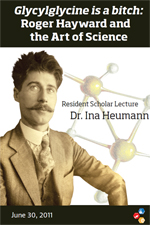Abstract

“Glycylglycine is a Bitch: Roger Hayward and the Art of Science” Watch Video
Ina Heumann's talk focuses on the division between illustration and text in scientific literature, and the personal relationships between the artist and scientist. Her talk centers on the work of scientific artist Roger Hayward; her sense of Hayward as a "border crosser" or someone who does not really fit in; his work in Scientific American magazine; and the value of illustrations in scientific text.
In preparing her talk, Heumann studied the Roger Hayward Papers, and the Ava Helen and Linus Pauling Papers at the Oregon State University Libraries Special Collections. These collections provided her with great insight into the relationship between Hayward, Linus Pauling, and Pauling's publisher Bill Freeman. Correspondence between Pauling and Freeman shed light on their personal views of Hayward. He was described by Freeman as a bit of a genius, though also a problem at times.
The collections revealed that there was a marked division between the artists and the scientists who collaborated on scientific projects in terms of the respect that they received, hierarchy, and the amount of money that they earned for their work. As an example, Hayward received a significantly smaller sum of money for his illustrative work on General Chemistry by Linus Pauling, than did Pauling for authoring the text.
Heumann found that the issue of fair compensation was quite common with the illustrators of scientific texts. She also notes that images tell their own story when looked at independently from the text, and that the importance of illustrations should not be underestimated. She concludes that illustrative work is essential to the development and communication of ideas.
Related Names: Linus Pauling, Roger Hayward


